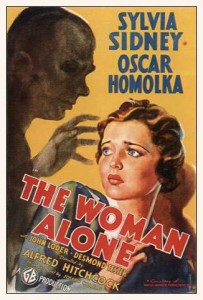“Sand. Sabotage. Wrecking. Deliberate. What’s at the back of it? Who did it?”
|

Synopsis:
While investigating the subversive activities of a foreign-born cinema owner (Oskar Homolka), an undercover detective (John Loder) in London finds himself falling in love with the cinema owner’s unsuspecting wife (Sylvia Sidney).
|
|
Genres, Themes, Actors, and Directors:
- Hitchcock Films
- Mistaken or Hidden Identities
- Sylvia Sidney Films
- Terrorists
- Undercover Agents and Cops
Review:
Widely acknowledged as one of Hitchcock’s bleakest films, this adaptation of Joseph Conrad’s novel (originally entitled The Secret Agent) takes place in a pre-WWII London where mass terrorism is being hatched behind closed doors, and it’s impossible to tell who may be The Enemy (sound familiar?). While Hitchcock himself denounced the film’s most infamous sequence (which I won’t reveal here), it’s a powerful cinematic experience, one which mercilessly portrays the unintended ripple effects of sabotage. The perennially child-faced Sylvia Sidney is perfectly cast as the unsuspecting wife, a naive woman who is literally incapable of recognizing anything evil in her husband until it’s too late. Homolka does a fine job playing the guilt-ridden yet committed saboteur (though it’s frustrating that his character’s motivations aren’t sufficiently fleshed out); and both Loder and Desmond Tester (as Sidney’s younger brother) provide some much needed levity. Not for the faint of heart, Sabotage remains a compelling tale of both marital deception (one of Hitchcock’s enduring themes) and widespread terrorism.
Redeeming Qualities and Moments:
Must See?
Yes. This early Hitchcock film — while terribly dark — shows true evidence of his no-holds-barred approach to storytelling.
Categories
Links:
|
One thought on “Sabotage (1936)”
Yes, a must – even if I don’t think it holds up all that well over a viewing or two. But that has more to do with the script than the director.
As noted in the assessment’s reason for being must-see, it’s Hitch’s approach to storytelling that raises the level of the somewhat heavy-handed tale he’s telling.
Though commonly referred to as “the master of suspense”, what we get here from the director is not suspense as much as unceasing uneasiness. (That could explain why this is “widely acknowledged as one of Hitchcock’s bleakest films”.) Just about everything in the film seems such a terrible strain for all concerned in it.
Perhaps the most interesting aspect of the film is how the protagonist (Homolka, oddly) has been forced to ‘sabotage’ his own marriage by dealing in dirty work to supplement income. (For me, that fleshes out enough of his motivation.)
It’s quite odd that Hitch would go on record denouncing the film’s most powerful (and authentic) sequence. That smells of a kind of abdication to the public – the kind of thing Joan Crawford often did: she would turn on films of hers (often good ones) which her public did not embrace. Phooey!
When I first saw this film, I came away again in awe of Sylvia Sidney: she has a kind of incandescence – even if this particular film does not give her more than a few sequences of real potency; one in particular coming toward the end – when she serves up a meal for two. The film’s second-best scene.
The ‘mandatory’ and oddly tacked-on love interest could have been handled with a bit more subtlety (script-wise).
Overall, ffs will most likely be glad to have seen this.